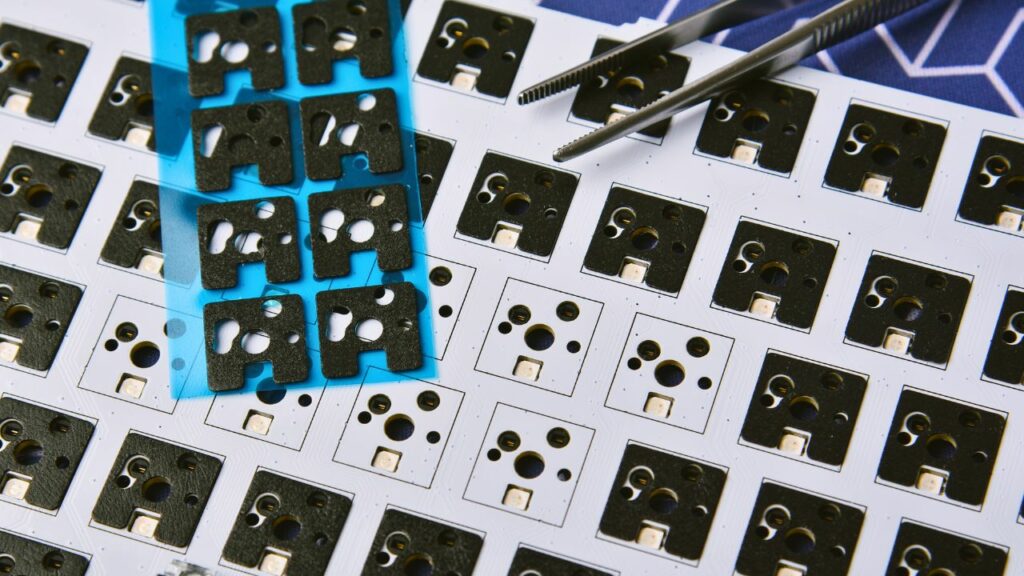
If you’re a lover of mechanical keyboards, you’re likely familiar with the satisfying feel of the keys under your fingertips. However, that sweet sensation often comes with a less appealing byproduct – noise. Whether it’s for the sake of your co-workers, family members, or just your own peace, mastering the art of silencing your mechanical keyboard can be a game-changer. This guide will walk you through several effective ways to reduce that characteristic ‘click-clack’, all while maintaining the tactile pleasure you love.
The Noise Behind Mechanical Keyboards
Mechanical keyboards are known for their distinctive sound because they use physical switches under each keycap. When these switches are pressed, they produce a click or clack sound. While some appreciate this auditory feedback, others may find it disruptive or annoying. But before you consider switching to a quieter, albeit less satisfying membrane keyboard, let’s explore some solutions to keep your beloved mechanical keyboard and peace at the same time.
Quieting Techniques for Your Mechanical Keyboard
1. Desk Mats: The Simple Solution
One of the easiest ways to reduce keyboard noise is by using a desk mat underneath your keyboard. Not only does it provide a stylish aesthetic touch to your gaming setup, but it also absorbs some of the vibrations produced during typing, making everything sound softer.
2. Foam Dampeners: The Stealthy Approach
Another way to lower overall volume is adding foam inside your keyboard. This serves as an excellent internal dampener by reducing vibration and resonance within the keyboard casing itself.
3. Rubber O-rings: The Quick Fix
Rubber O-rings can be installed under each keycap to dampen the sound created when keys hit the base during typing. They are cheap and easy to install – an ideal solution for those seeking immediate results.
4. Modding Stabilizers: For Better and Quieter Performance
Your space bar and other longer keys have stabilizers which can create additional noise if not properly managed. Modifying these stabilizers can improve both sound and performance.
5. Lubricating Switches: A Smoother Typing Experience
Lubricating switches is another method that helps in reducing noise levels and enhancing overall typing experience by making keypresses smoother and quieter.
Remember that you will need some equipment like tweezers or a switch opener as well as lube which should be applied with a paintbrush. If this process seems too daunting, check out our detailed guide on how to make mechanical keyboards quieter.
6.Replacing Switches: The Advanced Tactic
Replacing clicky switches with linear or tactile ones can significantly reduce noise levels; however, this requires desoldering old switches – a more complex process best suited for experienced users.
If your keyboard is hot-swappable (meaning no soldering needed), this process becomes much easier.
The Bright Side of Mechanical Keyboards
Even though silencing your mechanical keyboard might require some effort, remember there are plenty of benefits that come with using one such as easy repairability and customization options along with comfort during long gaming sessions.
For budget-friendly options in mechanical keyboards that don’t compromise on quality or performance, take some time out to explore our list of best budget mechanical keyboards.
Understanding the Role of Switches
The heart of any mechanical keyboard lies in its switches. They are responsible for registering your keypresses and, of course, that familiar clicking sound. There are three main types of switches: clicky (loud and tactile), tactile (quiet with a bump), and linear (quiet and smooth). Needless to say, clicky switches tend to be the noisiest, so if you’re starting from scratch or considering a switch replacement, opting for tactile or linear switches could be a sound-reducing solution.
Soundproofing Your Gaming Environment
While silencing your mechanical keyboard is one way to reduce noise during intense gaming sessions, it’s also worth considering how you can soundproof your gaming environment. This could involve using thick curtains, carpeting, or even acoustic foam panels on walls. A quieter room will naturally help to minimize any residual keyboard noise.
Keyboard Maintenance for Quieter Operation
Regular cleaning of your mechanical keyboard can also contribute to quieter operation. Dust and debris can affect keypress smoothness and therefore increase noise over time. Regular cleaning with compressed air or gentle brushing can keep your keys functioning quietly and efficiently.
Investing in Silent Keyboards
If all else fails and silencing techniques don’t deliver the quietness you desire, investing in specially-designed silent keyboards could be an option. These keyboards come equipped with silenced switches that significantly reduce noise levels while maintaining the beloved mechanical feel.
FAQs about Silencing Mechanical Keyboards

1. Can I completely eliminate the sound from my mechanical keyboard?
While these methods will significantly reduce noise levels from your keyboard, completely eliminating the sound is unlikely due to the nature of mechanical switches. However, a combination of these methods can make your typing or gaming experience much quieter.
2. Will lubricating my keyboard switches make them less effective?
On the contrary! Lubrication not only makes keystrokes quieter but also smoother. It reduces friction between moving parts which can prolong switch lifespan as well.
3. How often should I clean my mechanical keyboard?
A monthly clean-up is typically sufficient for maintaining optimal performance and minimal noise levels. For heavy users or those in dustier environments, more frequent cleaning may be required.
4. Are silent keyboards as satisfying to use as regular mechanical keyboards?
This largely depends on personal preference. Some players find that silent keyboards provide a similar tactile feedback without excessive noise, while others might miss the distinctive ‘click’ associated with regular mechanical keyboards.
In Conclusion…
Silencing a mechanical keyboard might seem like an uphill task initially but with patience and practice, it’s quite achievable.
Remember every keystroke tells a story – whether it’s defeating an opponent in an intense online battle or writing an important report – so why not make sure yours does so quietly?